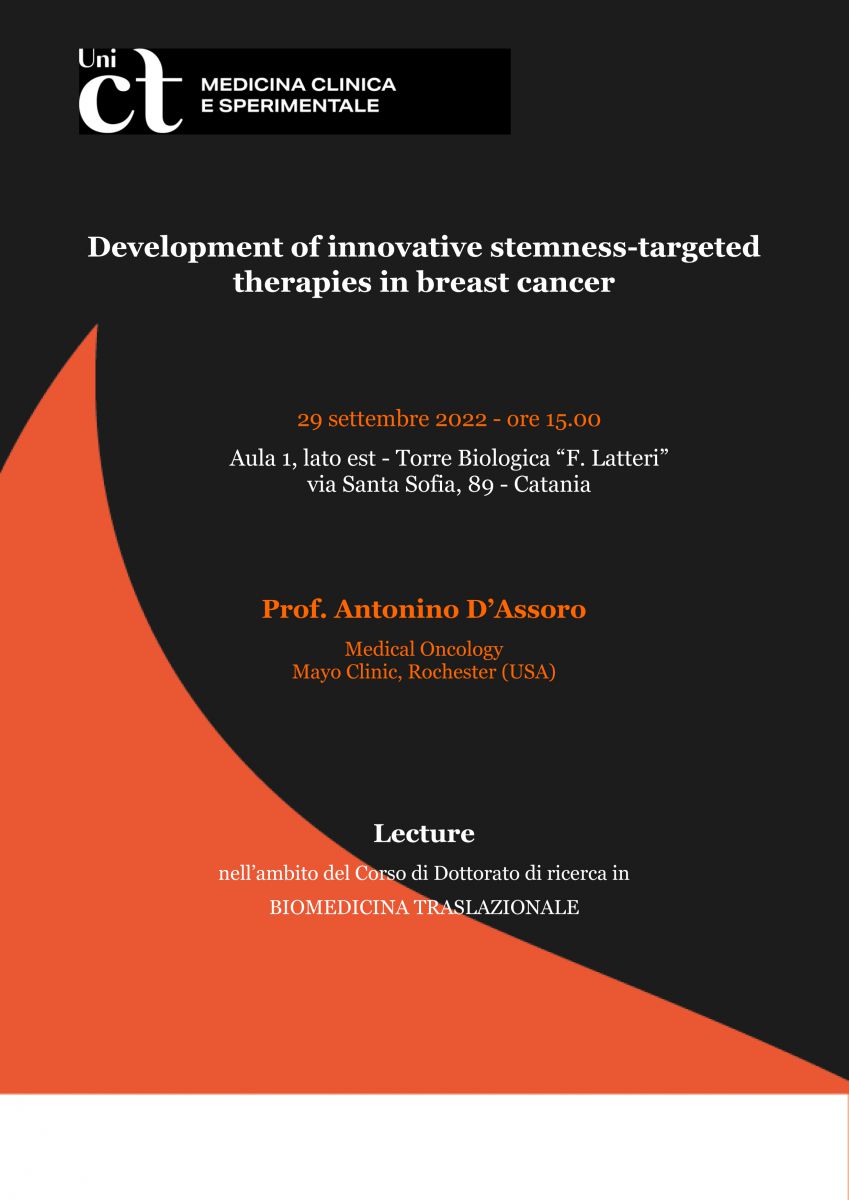Development of innovative stemness-targeted therapies in breast cancer
 In programma, nell’ambito delle attività formative del dottorato di ricerca in Biomedicina Traslazionale, la lecture sul tema "Development of innovative stemness-targeted therapies in breast cancer" tenuta dal prof. Antonino D'Assoro, professore associato alla Mayo Clinic di Rochester, MN (USA), che si svolgerà giovedì 29 settembre alle ore 15.00 nell'Aula 1 della Torre Biologica "F. Latteri".
In programma, nell’ambito delle attività formative del dottorato di ricerca in Biomedicina Traslazionale, la lecture sul tema "Development of innovative stemness-targeted therapies in breast cancer" tenuta dal prof. Antonino D'Assoro, professore associato alla Mayo Clinic di Rochester, MN (USA), che si svolgerà giovedì 29 settembre alle ore 15.00 nell'Aula 1 della Torre Biologica "F. Latteri".
Abstract
Early relapse and breast cancer progression is linked to the enrichment of a sub-fraction of cancer cells, termed cancer stem-like cells (CSCs). These cells undergo epithelial to mesenchymal transition (EMT) and typically exhibit a basal-like CD44high/CD24low and/or ALDHhigh phenotype,with critical cancer stem-like features, such as high self-renewal capacity and intrinsic (de novo) resistance to standard of care chemo-endocrine therapy. One of the major mechanisms responsible for the intrinsic drug resistance of CSCs is their high ALDH activity, leading to inhibition of chemotherapy-induced apoptosis. Studies of Prof. D’Assoro’s laboratory have demonstrated for the first time that aberrant activation of Aurora-A Kinase (AURKA) induces EMT and stemness reprogramming, that promotes in turn the enrichmnet of CSCs after treatment with standard of care anti-cancer drugs. This mechanism is responsible for early tumor relapse and progression. Significantly, these preclinical studies have led to two innovative clinical trials with the AURKA inhibitor alisertib in metastatic ER+ breast cancer patients. Preclinical studies in Prof. D’Assoro’s laboratory showed that combination of taxanes with dual TGF-b and AURKA pharmacologic targeting impaired tumor relapse and development of organ metastases in Triple Negative Breast Cancer (TNBC) models. Taken together, these findings reveal the critical role of AURKA oncogenic signaling in mediating TGF-b-induced cancer cell plasticity, chemoresistance and tumor progression. Moreover, recent studies in Prof. D’Assoro’s laboratory have defined the role of key stemness signaling pathways in regulating PD-L1 expression and the immune evasion capacity of cancer cells. These ongoing studies will lead to innovative stemness-targeted clinical trials to enhance the therapeutic efficacy of FDA-approved Immune Checkpoint Inhibitors and improve the clinical outcome of patients.

Biography
Antonino B. D’Assoro M.D.; Ph.D. - Mayo Clinic School of Medicine, Rochester, MN, USA
Born in Catania, on 15th July 1973, Prof. Antonino B. D’Assoro has completed his M.D. at the University of Catania (Italy) in 1998 and received his PhD in 2006, from a joint collaboration between the University of Catania and the Mayo Graduate School of Medicine. He has completed his postdoctoral studies in the Department of Biochemistry and Molecular Biology at the Mayo Clinic, under the mentorship of Prof. Jeffrey Salisbury. Prof. D’Assoro and his research team are recognized experts in breast cancer stemenss biology and early development of clinical trials. Currently, Prof. D’Assoro holds the academic appointment of Associate Professor of Pharmacology in the Department of Medical Oncology at the Mayo Clinic, Rochester, Minnesota, USA. He is the Program Director of a NIH and Minnesota Parthnership funded cancer research laboratory and he is an established study section committee member of NIH and the American Department of Defense for the selection of competitive research grants.
inally, Prof. D’Assoro has published more than 40 papers in reputed journals and has been serving as an editorial board member of international journals.